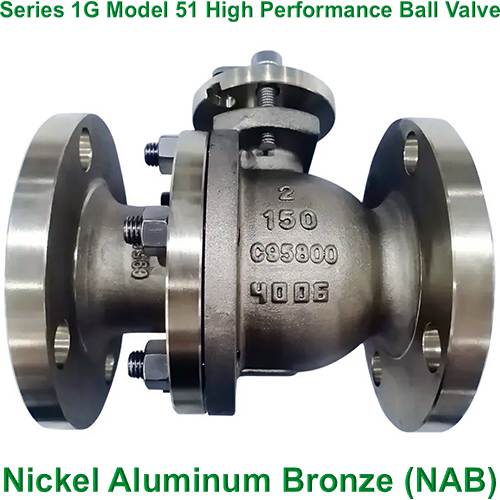C95800 is a nickel-aluminum bronze alloy with a unique combination of properties that has led to its widespread application across multiple industrial sectors. Freeman Valve's C95800 ball valves offer the following significant advantages:
1.1 Excellent Corrosion Resistance:
a. Freeman Valve's C95800 ball valves are highly resistant to seawater, saltwater, acidic environments (such as sulfuric acid and hydrochloric acid), and alkaline media, making them particularly suitable for marine environments.
b. Freeman Valve's C95800 ball valves are superior to ordinary bronze or stainless steel in cavitation and erosion corrosion resistance.
1.2 High Strength and Wear Resistance:
Freeman Valve's C95800 ball valves offer high tensile strength (over 620 MPa) and a hardness of over HB 200, making them suitable for high-load, high-wear applications. They also exhibit excellent fatigue resistance, making them suitable for dynamically loaded components.
1.3 Biocompatibility and Biofouling Resistance:
Freeman Valve's C95800 ball valves are resistant to marine biofouling when used in marine components, reducing maintenance requirements.
1.4 Thermal Conductivity and Electrical Conductivity:
Freeman Valve's C95800 ball valves offer superior thermal conductivity compared to stainless steel, making them suitable for components requiring heat dissipation.
2. When using C95800 ball valves, please note the following:
2.1 Be aware of the potential risk of stress corrosion cracking (SCC) in C95800 ball valves: Stress corrosion cracking may occur in certain environments (such as ammonia and high stress), requiring heat treatment to mitigate the risk.
2.2 Avoid using C95800 ball valves in concentrated nitric acid, high-temperature, high-concentration hydrochloric acid, or media containing ammonia (which are susceptible to SCC).
3. Mechanism of Acid Corrosion Resistance of C95800 ball valves:
The corrosion resistance of C95800 ball valves primarily relies on the dense oxide film (Al₂O₃ + Cu₂O) formed on their surface, which remains stable in acidic environments:
3.1 Role of Aluminum (8.5-9.5%) in C95800 ball valves: Promotes the formation of the Al₂O₃ film, inhibiting acidic media from corroding the substrate.
3.2 Role of Nickel (4-6%) in C95800 ball valves: Enhances the stability of the passivation film, especially in acidic environments containing sulfur and chlorine.
3.3 Contribution of Iron and Manganese in C95800 ball valves: Refines the grain size and reduces the risk of localized corrosion.
4. C95800 Ball Valves Behavior in Typical Acidic Environments:
4.1 C95800 Ball Valves for Dilute Sulfuric Acid (H₂SO₄): Excellent corrosion resistance (≤10% concentration, room temperature), superior to ordinary bronze. Corrosion rates accelerate at high concentrations or temperatures. However, consideration should be given to factors such as temperature, concentration, and oxidizing properties (for example, air accelerates corrosion).
4.2 C95800 Ball Valves for Hydrochloric Acid (HCl): Average corrosion resistance (especially at concentrations >5% or high temperatures). Cl⁻ can damage the passivation film, but superior to 304 stainless steel. However, consideration should be given to factors such as Cl⁻ concentration, pH, and flow rate (erosion corrosion).
4.3 C95800 Ball Valves for Phosphoric Acid (H₃PO₄): Excellent performance, suitable for low to medium concentrations of phosphoric acid. However, consideration should be given to factors such as impurities (e.g., fluoride can exacerbate corrosion).
4.4 C95800 Ball Valves for Nitric Acid (HNO₃): Not corrosion-resistant (strong oxidizing acids damage the Cu-Al film), limited to very low concentrations. However, attention should be paid to concentration; rapid corrosion occurs at concentrations >5%.
4.5 C95800 Ball Valves for Organic Acids (e.g., acetic acid): Excellent corrosion resistance, suitable for food/chemical equipment. However, consideration should be given to key factors such as temperature and oxygen content.
5 Summary:
The C95800 ball valve's corrosion resistance in acidic media stems from its Al-Ni synergistic passivation effect, particularly in moderate to low concentrations of non-oxidizing acids (e.g., H₂SO₄, H₃PO₄) and weak acids containing Cl⁻. However, strong oxidizing acids should be avoided. Its comprehensive performance (corrosion resistance, wear resistance, and strength) makes it a cost-effective choice for acidic environments in chemical, marine, and other fields. However, for extreme conditions, nickel-based alloys or titanium should be considered.


